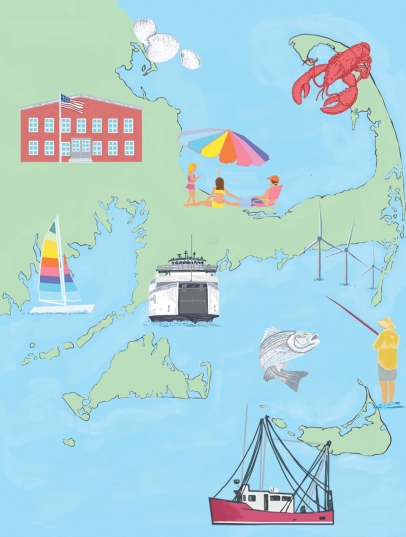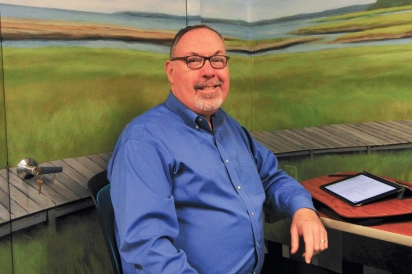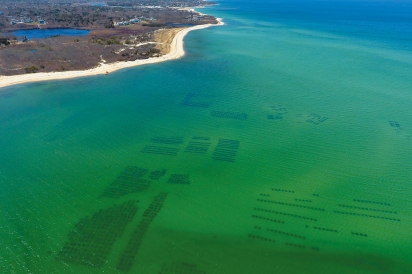The Blue Economy
It is no surprise to us that the economy of our region is largely based around water, both salty and fresh, and the Cape Cod Chamber of Commerce tapped into this when they launched The Cape Cod Blue Economy Project in 2015. The Cape Cod Blue Economy Foundation, as it is now known, is a regional initiative to stimulate and support a maritime-focused economy on Cape Cod, Martha’s Vineyard, Nantucket and southern Plymouth County. Cape Cod, surrounded by water with over 1000 miles of coastline, is also home to kettle ponds, estimates of which range from 365 to nearly 1000.
Bert Jackson, Director of Community Engagement, said the Cape Cod Blue Economy Foundation acts as a catalyst to bring ideas and partners together for sustainability of two local resources—our people and our waters. At a 2014 meeting, the Chamber board asked, “What’s the next piece needed for our local economy?” Shortly thereafter, they received a Massachusetts Seaport Economic Council grant to identify and advance industries and institutions that work with, on, for or near water. The Foundation acts “as a springboard into the future and a tie to the past,” according to Jackson. He and Leslie Ann McGee, Director of Data Interpretation for the Foundation, are contracted under the Chamber.
In the fall of 2016, a team traveled from Provincetown to south Plymouth County to the Islands in a nine-part listening project to learn what a vibrant maritime and technical economy might entail. They listened to shellfish growers, selectmen, Rotary Clubs, Chambers, trade associations, harbormasters and many others. They found they needed to integrate marine science and technology, renewable energy, coastal resiliency and management and wastewater issues.
Three themes emerged: healthy water = healthy economy; a vibrant maritime and technology economy; and a prepared and educated workforce for the future is required.
Healthy Water = Healthy Economy
The economic security of the Cape and Islands region relies on viable and sustainable water resources. Targeted expenditures that support clean water, working waterfronts and access to water are vital to sustaining our Blue Economy. The action plan includes developing and strengthening innovative water-based technology companies and connecting wastewater and other regional challenges to entrepreneurs, grants and other funding sources.
Goals include providing more consistent and dependable access to water areas for working, conservation and recreation communities; and providing incentives for private commercial waterfront owners to grant working water access.
A Vibrant Maritime and Technology Economy
The Cape and Islands region has historically been a center of maritime industries—from whaling and fishing to shipbuilding—and played a significant role in our understanding of water ecosystems. Today we have twenty active ship builders in the region. In 1930, only 50 years after the ocean began to be systematically analyzed, the Woods Hole Oceanographic Institution (WHOI) joined a vibrant ocean science community in Woods Hole that included the Marine Biological Laboratory and the National Marine Fisheries Service. The Foundation’s work around this initiative will help grow the economic contribution of these sectors in the region through continued innovation and investment into existing and emerging areas.
The Foundation supports developing, strengthening and retaining new innovative water-based technology companies and has established a set of criteria toward that end. They continue to support the evolution of the WHOI entrepreneurship and technology transfer program so that it can be replicated and expanded.
A Prepared and Educated Workforce
“WaterWORKS”, the Blue Economy Career Day held at Cape Cod Community College in January, gathered 350 students in grades 11 and 12 to visit Blue Economy-related vendors.
The education effort, however, starts in grades 6-9, with periodic surveys regarding career intentions and perceptions of blue careers among youth. The survey provides insight for future awareness- building initiatives and career development programs: partnerships for post-high school apprenticeships, vocational schools curricula and community college certificates and degrees. Surveying younger students provides useful insights into when and how their career perceptions are formed, indicating the best time for blue career awareness and exposure building programs.
Last August, Woods Hole Sea Grant teamed up with Earthwatch for its “Girls in Science Fellowship”. This fellowship aims to promote diversity and expose young women to a variety of marine careers in STEM (Science Technology Engineering and Math). While not technically developed by the Foundation, Jackson and McGee help get the word out.
Community Players
Aquacultural Research Corporation in Dennis (ARC) plays a vital role in local and regional shellfish communities by providing the highest quality shellfish—from spawn to table— to growers, distributors, chefs and reef-builders along the East Coast. According to Rick Sawyer, Sales & Marketing Manager for ARC, most of their scallop, oyster and clam seed is sold to support the aquaculture industry and shellfish growers on Cape Cod and along the South Shore.
Jackson said they have identified 1300 organizations and businesses in the Cape & Islands Region that contribute to or benefit from the Blue Economy. These have been color-coded for those directly impacted. Dark blue is assigned to businesses that are directly dependent on the water (fishermen, marine trade, water transport and sales), and medium blue is assigned to businesses that the dark blue businesses rely upon, or businesses that are likely located in the region because of the water (tourism-affected ones, such as restaurants and hotels) but are not directly dependent on the water. Unofficially, light blue is pretty much everything else; businesses that would exist anyway as infrastructure.
In February 2019, the Cape Cod Chamber of Commerce, in partnership with the Town of Barnstable and the Foundation, received a $1 million grant to create “Expedition: Blue!”, a major step toward the regional branding of the Blue Economy. Funded by Governor Baker’s Seaport Economic Council, “Expedition: Blue!” will create a network of interconnected permanent installations about the region’s connection to the sea. World ocean research and discovery, our fishing and aquaculture heritage and strong inventory of blue economy institutions and industries will be represented in a logical and linked geographic trail. Appealing to educators, visitors and locals, this project will connect deep, medium and light blue sectors with the past, present and future of the Blue Economy.
There are many businesses for which the blue is more ombré. Jackson noted that a lawyer can be medium blue (real estate transfers) to light blue, and while teachers are not financially dependent on water, it often becomes part of their curriculum. Maritime artists as well as photographers such as Christopher Seufert, whose photographs are mostly coastal, are a compilation of all three shades, depending upon subject matter. “This is truly an example of the ‘trickle-down effect’ of a water-based economy,” Jackson said with a chuckle.
What’s Blue with You? Tell them your story!
The Blue Economy affects virtually all of us who live in the Cape and Islands region. The Foundation wants to hear about your connection to the Blue Economy. Do you work daily on or in the water, serve those who do, provide hospitality for visitors, or create art based on the water? The Foundation wants to capture all aspects of our relationship, dependence upon and love of all things Blue. Go to the Blue Economy website and tell them how you fit in to this “Culture of Blue.” They are listening.
bluecapecod.org
508-362-3225







